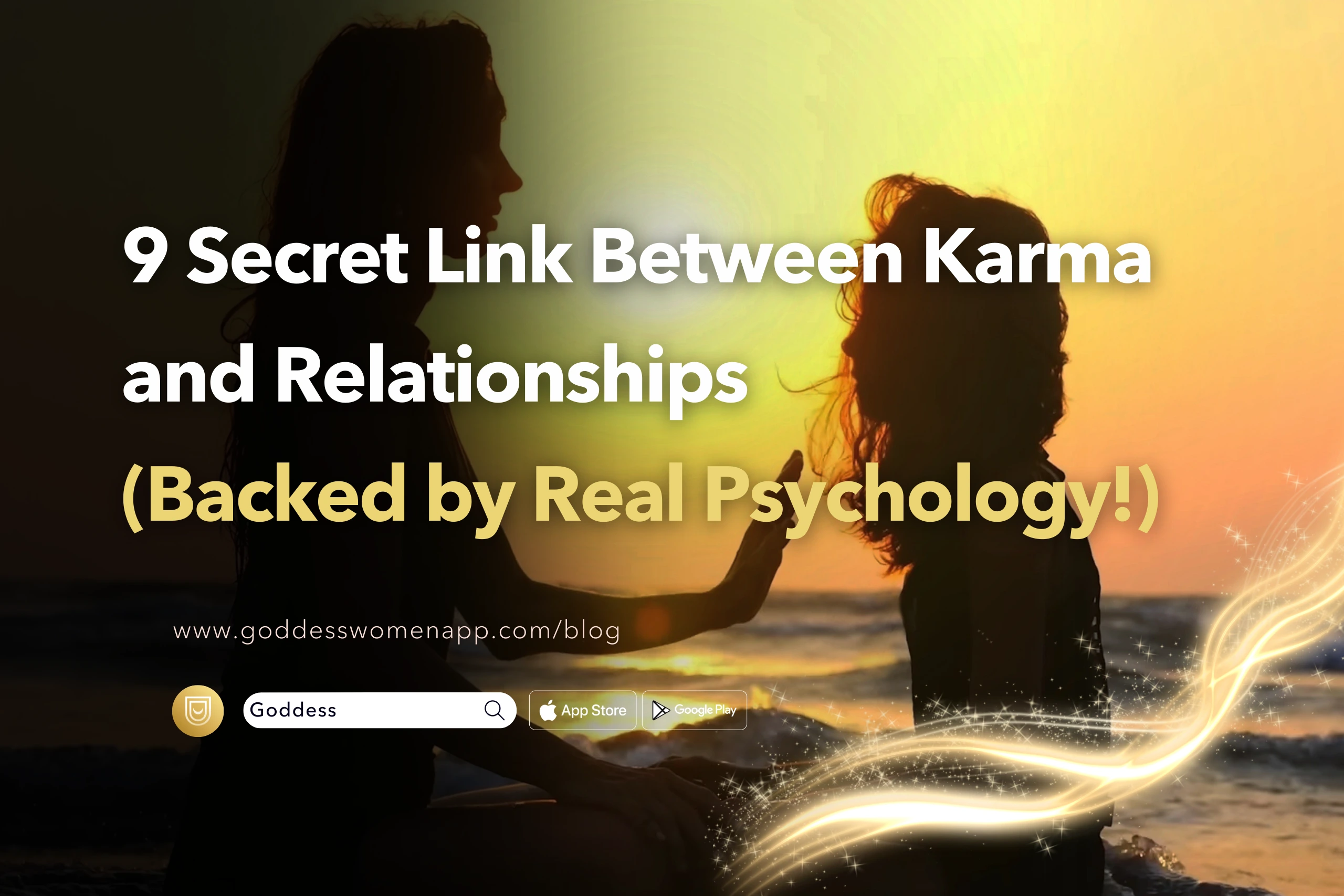Ever wondered why certain relationships feel like déjà vu, as if you’ve met that person before or are trapped in a recurring emotional loop? This phenomenon is often attributed to the interplay between karma and relationships.
Karma, a concept rooted in ancient philosophies, suggests that our actions and intentions shape our experiences, including our interpersonal connections. In the realm of psychology, similar patterns are observed, where past behaviors and experiences influence current relationship dynamics. Understanding the synergy between karma and relationships can offer profound insights into our emotional patterns and growth.(Psychology Today)

What Is Karma, Really? The Psychology Behind the Belief
Karma, originating from Sanskrit meaning “action,” is a principle of cause and effect, where every action has consequences. In psychological terms, this mirrors the concept that our behaviors and choices impact our mental and emotional well-being. Psychologists recognize that our actions, driven by conscious or unconscious motives, can lead to patterns that affect our relationships. This understanding bridges the spiritual concept of karma with psychological theories of behavior and consequence.(Psychology Today)
How Karma and Relationships Connect on a Deep Level
The connection between karma and relationships lies in the patterns we unconsciously repeat. For instance, someone who experienced neglect in childhood may unconsciously seek similar dynamics in adult relationships, perpetuating a cycle. This repetition aligns with the karmic idea of unresolved issues resurfacing until addressed. Psychology supports this through attachment theory, which explains how early experiences shape our relationship patterns.

9 Psychological Principles That Reflect Karma in Relationships
1. Law of Cause and Effect
In psychology, the principle of cause and effect emphasizes that every action has a consequence. This mirrors the karmic belief that our behaviors influence future experiences. For instance, consistent negative behaviors in a relationship can lead to trust issues or emotional distance, while positive actions foster closeness and trust. Understanding this principle encourages individuals to be mindful of their actions, recognizing that they shape the dynamics of their relationships.
2. Law of Responsibility
Taking ownership of one’s actions is crucial in both karma and psychology. Psychologically, this aligns with the concept of personal responsibility, where individuals acknowledge their role in relationship dynamics. By accepting responsibility, one can address issues constructively, leading to healthier interactions and personal growth.
3. Law of Growth
Personal development is essential for fulfilling relationships. Psychology emphasizes the importance of self-awareness and growth, suggesting that as individuals evolve, their relationships can become more meaningful and resilient. This principle resonates with the karmic idea that growth leads to better outcomes in future interactions.
4. Law of Reflection
The Law of Mirrors in karma suggests that our relationships reflect our inner selves. Psychologically, this is akin to the concept of projection, where individuals attribute their own feelings or traits to others. Recognizing this can help individuals understand their behaviors and emotions, leading to improved self-awareness and relationship dynamics. (grethaal.com)
5. Law of Focus
Where attention goes, energy flows. In relationships, focusing on positive aspects can enhance satisfaction and connection. Psychology supports this through the concept of selective attention, where individuals’ focus influences their perceptions and experiences. By consciously directing attention to positive behaviors and outcomes, relationships can flourish.(RSIS International)

6. Law of Connection
This principle emphasizes the interconnectedness of all actions. In psychology, systems theory suggests that individuals are part of larger systems, and their behaviors affect and are affected by others within these systems. Understanding this interconnectedness can help individuals recognize the broader impact of their actions in relationships.
7. Law of Here and Now
Being present is vital for healthy relationships. Mindfulness, a psychological practice, encourages individuals to focus on the present moment, enhancing awareness and reducing reactivity. This aligns with the karmic principle of living in the present to create positive future outcomes.(Wikipedia)
8. Law of Change
Change is inevitable and necessary for growth. Psychologically, adaptability and openness to change are associated with resilience and healthy relationships. Embracing change allows individuals to evolve and improve their interpersonal connections.
9. Law of Patience and Reward
Patience in relationships often leads to deeper understanding and connection. Psychology supports this through the concept of delayed gratification, where individuals forego immediate rewards for long-term benefits. Practicing patience can result in more fulfilling and enduring relationships.
By understanding and applying these psychological principles, individuals can foster healthier, more fulfilling relationships. These concepts mirror the karmic idea that our actions and intentions shape our interpersonal experiences, emphasizing the importance of self-awareness, responsibility, and growth.
Karma and Relationships in Romantic Love
Romantic relationships often serve as a mirror to our inner world. They can bring unresolved issues to the surface, offering opportunities for healing and growth. Karmic relationships, in particular, are intense connections believed to be rooted in past experiences, challenging us to confront and resolve lingering emotional patterns.
Can You Break a Karmic Cycle? Absolutely. Here’s How
Breaking free from karmic cycles involves self-awareness and intentional action. Therapeutic approaches, such as cognitive-behavioral therapy, can help identify and alter negative patterns. Mindfulness practices and self-reflection also play a role in recognizing and transforming these cycles, leading to healthier relationships in Goddess app.
With the help of technology, it becomes easier to start living with intention and separate yourself from karma and relationships. Taking the first intentional step to release yourself from your karma will begin the unfolding of many truths.

6 Signs You’re in a Karmic Relationship
- Intense emotional highs and lows
- Feeling a strong, inexplicable connection
- Repetitive arguments or issues
- Difficulty in letting go, despite challenges
- A sense of familiarity, as if you’ve known them before
- Personal growth stemming from the relationship’s challenges(Verywell Mind)
Toxic or Transformational? Karma’s Role in Breakups
Breakups in karmic relationships can be both painful and enlightening. They often serve as catalysts for personal growth, forcing individuals to confront and heal deep-seated issues. Understanding the karmic lessons can transform the pain of separation into a powerful journey of self-discovery.
Rewriting the Script: Turning Karma Into Growth
Transforming karmic patterns involves conscious effort and self-compassion. Practices such as journaling, therapy, and mindfulness can aid in identifying and altering detrimental behaviors. Embracing these changes leads to personal growth and healthier future relationships.
Karma and Relationships in Family Dynamics
Family relationships often carry karmic elements, with patterns and behaviors passed down through generations. Recognizing these patterns allows individuals to break the cycle, fostering healthier family dynamics and personal well-being.

Real People, Real Karma: Stories of Love and Lessons
- Emma’s Story: Emma found herself repeatedly attracted to emotionally unavailable partners. Through therapy, she realized this pattern mirrored her relationship with her distant father. Recognizing this, she began to seek healthier connections.
- Liam’s Journey: Liam’s tumultuous relationship ended abruptly, leaving him devastated. Reflecting on the experience, he acknowledged his tendency to avoid conflict, which contributed to unresolved issues. This insight led him to develop better communication skills.
- Sophia’s Transformation: Sophia’s controlling relationship mirrored her childhood experiences. By confronting her past and setting boundaries, she broke free from the cycle, paving the way for healthier relationships. Her karma and relationships have been healed, and she feels more fulfilled in her current connections.
7 Empowering Truths to Remember About Karma and Relationships
- Your actions influence your relationship experiences.
- Self-awareness is key to breaking negative cycles.
- Challenges in relationships offer opportunities for growth.
- Healing past wounds leads to healthier connections.
- Setting boundaries is essential for personal well-being.
- Every relationship teaches a lesson, even painful ones.
- You have the power to change your relationship patterns.(RSIS International)

Conclusion: Embracing the Journey of Karma and Relationships
Understanding the interplay between karma and relationships offers profound insights into our emotional patterns and growth. By recognizing and addressing these patterns, we empower ourselves to foster healthier, more fulfilling connections. Embrace the lessons, grow through the challenges, and remember that every relationship is a step on your journey toward self-discovery and love.
Karma and relationships are deeply connected. The repetitive comfort zone and its unchanging results are leaving many feeling stuck and disillusioned. What you can do is first and foremost realizing your repetitive karma and relationships then taking the step to change the current situation.
It’s easier to said than done, I know. However, it wont happen over night. You have to be patient and compassionate yourself throughout this journey. Then karma and relationships will be much more visible and harder to ignore for you. Your actions will become automatic. Karma and relationships are waiting for you to discover and release to be your most authentic self.
Learn more:




